Breast Enlargement (Implants, Enhancement & Augmentation)
 Breast augmentation (enlargement, enhancement, boob job) is one of the most common and most popular operations in cosmetic surgery.
Breast augmentation (enlargement, enhancement, boob job) is one of the most common and most popular operations in cosmetic surgery.
5-10 million women worldwide have breast implants. Many women feel unhappy and embarrassed with the size of their breasts. On many occasions this can reflect on their self-esteem and confidence. It can restrict your choice of clothing and limit activities such as swimming. This can be since puberty; or following childbirth, weight loss or simply to try and maintain the youthful shape of a firm breast as we get older. Other women feel simply that an enhanced breast would suit their body frame better.
Breast enlargement (augmentation, commonly known as boob job) may help to make you feel more confident and feminine. Breast enhancement can also be used to improve on asymmetry. Breast enlargement (enhancement, implants, augmentation, commonly known as boob job) is one of the most gratifying operations with high satisfaction rate.
Listen to the recent Audio Interview between Chester Dee 106.3 Radio and
Professor Fahmy discussing Breast Surgery
What is Breast Enlargement (Enhancement, Implants, Augmentation)?
This is an operation where breast implants are inserted to enlarge the size of the breasts. Silicone and saline breast implants are available for enhancement. Saline breast implants are mostly used for reconstruction. Silicone breast implants are widely used as they give a more natural shape and feel. Many studies have been conducted to establish the safety of the silicone breast implants in augmentation. The studies confirmed the safety of the implants and hence widely used. There is no specific shelf life time for the breast implants.
There are 2 main shapes of silicone breast implants; the shaped “tear drop” implant and the round implant. The pros and cons of each and their suitability to your requirements are best discussed during the consultation.
There are 2 main potential sites of insertion for your breast implants;
1. Deep to your Pectoralis muscle (Submuscular)
2. On top of muscle but deep to breast tissue (Submammary).

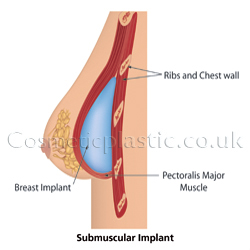
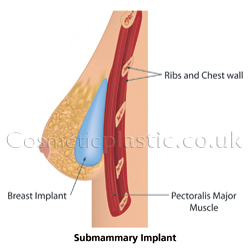
The pros and cons of each location and their suitability to your requirements are best discussed during the consultation. The same applies when discussing the size of the breast implants.
The Surgery of Breast Augmentation (Enhancement, Enlargement, Implants)
Breast enlargement (enhancement, augmentation, implants, also known as boob job) surgery is performed under a general anaesthetic (while you are asleep). It involves insertion of breast implants. The possible incisions for breast enlargement are:
1. A small scar very close to the crease under the breast (most common) OR
2. Around the areola (brown circle surrounding the nipple) OR
3. Under the Armpit.
You are usually in the hospital for 1-2 nights. If drains were used, they will be removed prior to your discharge.
Our surgery includes a lifetime warranty on the implant, in case of rupture. You will only be charged for the cost of surgery, excluding the implant price, in case of rupture.
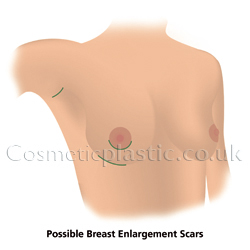
Recovery from Breast Augmentation (Enlargement, Enhancement, Implants)
You may experience some discomfort after breast enhancement surgery, but usually pain is very well controlled. You are advised to wear a supportive bra before you leave the hospital and asked to keep the dressings dry. 7- 10 days after surgery you will be seen to reduce and check the dressings. The stitches are usually removed around 2 weeks after surgery. It is best to continue wearing the bra day and night for 6 weeks and avoid any physical or strenuous exercise for a similar period. Under wired bras are best avoided for approximately 6 months.
Potential Risks of Breast Augmentation (Enlargement, Enhancement, Implants)
Every surgical procedure carries a certain amount of risk, and it is important that you understand the risks involved with breast enlargement (augmentation, enhancement, implants, also known as boob job).
The scar from breast enlargement usually heals very well and is easily disguised. In a small number of cases, the healing may result in a red lumpy scar. There could be a certain degree of asymmetry, however most breasts are not exactly symmetrical. The sensation of the skin and nipple can sometimes be altered following breast enlargement. Breast implants can sometimes wrinkle/ripple and this can be palpable.
The body tends to form scar tissue on the inside to surround the breast implant “capsule formation”. This on occasions can become thickened and contracted. The current breast implants are designed to reduce the likelihood of this happening. This can affect around 10% of patients and can occur anytime after surgery. The implants can feel hard, affecting the shape of the breast and may result in pain. Treatment may be needed.
Breast augmentation (enlargement, enhancement, implants, also known as boob job) does not affect your ability to breast-feed. There is no evidence that breast enlargement causes breast cancer. Nor does it prevent your breast from being examined for cancer in the usual way. However you must mention that you have breast implants when going for mammogram, as special x-ray views may be required.
Anaplastic Large Cell Lymphoma (ALCL) is an extremely rare type of immune system cell cancer. Over the last 2 decades, there have been rare reports of ALCL occuring in patients with breast implants. This has led the medical community to recognise a new and different type of ALCL, referred to as Breast Implant-Associated ALCL (BIA-ALCL). 3 in 100 million per year in the USA diagnosed with ALCL in the breast. It is estimated that between 5 and 10 million women have breast implants. Fewer than 200 cases reported in published medical papers since 1997. Since the initial MHRA medical device alert in the UK in 2011 only three cases of Anaplastic Large Cell Lymphoma (ALCL) have been reported. Recently in 2017, the figures of the incidence have been revised to 1:1000 and 1:10,000 in patients with bilateral implants.
ALCL is a lymphoma (cancer of the immune system) and not cancer of the breast tissue. BIA-ALCL doesn't appear to behave in the same way as ALCL and in most cases is less severe, hence the clinical prognosis is generally good. When breast implants are placed in the body, a fibrous scar called a capsule develops around the implant, separating it from the rest of the breast. In women with breast implants, the ALCL was generally found adjacent to the implant itself and contained within the fibrous capsule.
It should be noted that ALCL is extremely rare and treatable. The MHRA advises no change to current practice and patients should be advised that ALCL is a rare condition. For further information on ALCL, please follow this link and the government guidance.
Breast implant illness remains a vague condition with a constellation of symptoms affecting a relatively small group of patients. Ongoing research is being conducted; however, to date there has been no definitive study clearly linking these symptoms to breast implants to counter the overwhelming evidence to support the safety of breast implants.
It is advisable that any women with breast implants who experience any sudden unexplained changes, lumps or swelling should speak to their GP or their surgeon.
Bleeding, infection, wound break down, excessive scarring, blood clots in leg veins and/or lung and further revisional surgery are general risks that can follow any operation. It's difficult to promise/predict a particular size or shape after breast enlargement.
Before and After pictures of Breast Augmentation (Enlargement, Enhancement, Implants)
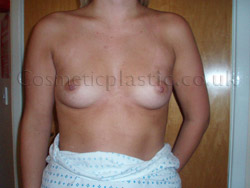
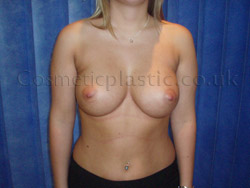
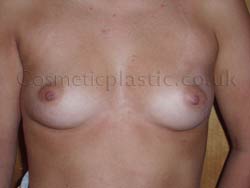
-(2)-WEB.jpg)
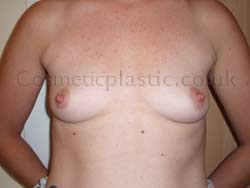
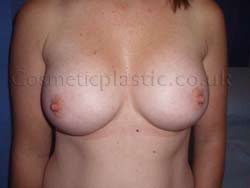
The information provided gives you a basic understanding of the breast enlargement (augmentation, enhancement, implants) procedure but it may not answer all your questions, a lot depends on your individual circumstances. This website provides guidance and is not intended to be a substitute for a surgical consultation with Professor Fahmy in Shropshire, Chester, Cheshire or Wrexham, North Wales and Mid Wales.
For any enquiries, you can email Professor Fahmy on info@cosmeticplastic.co.uk . Your consultation will be directly with Professor Fahmy and the treatment will be performed by himself at the hospital of your choice at Abergele clinics, Pulford Medical Centre, Chester (Cheshire) or Spire Yale Hospital, Abergele & Wrexham (Wales). It is always advisable to bring a friend or a relative during your consultation, as it may further assist you in any questions you may have.
Notice of Copyright ©: 01 July 2008 - The documents and images on this website have been created by Prof. F Fahmy (author), who reserves all rights to their use for purpose of publication, sale, commercial gain, or promotion. Permission must be sought to download, reproduce, copy, print, or otherwise transform any of the documents or images on this website. The copyright for all pictures remains with Prof. F Fahmy.